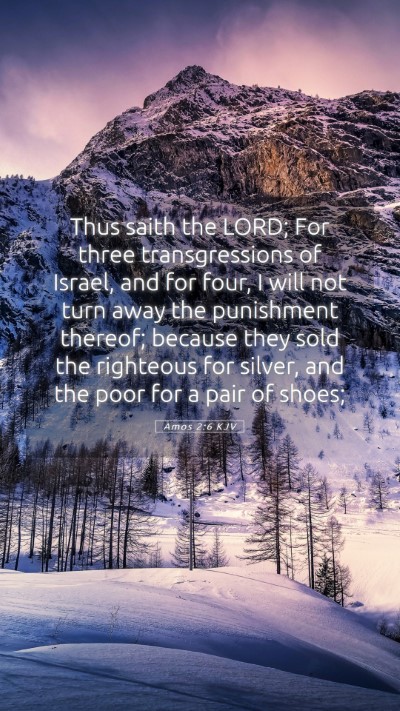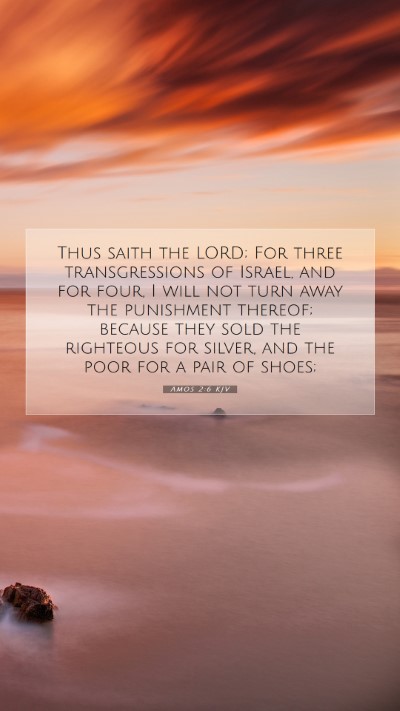Old Testament
Genesis Exodus Leviticus Numbers Deuteronomy Joshua Judges Ruth 1 Samuel 2 Samuel 1 Kings 2 Kings 1 Chronicles 2 Chronicles Ezra Nehemiah Esther Job Psalms Proverbs Ecclesiastes Song of Solomon Isaiah Jeremiah Lamentations Ezekiel Daniel Hosea Joel Amos Obadiah Jonah Micah Nahum Habakkuk Zephaniah Haggai Zechariah MalachiAmos 2:6 Meaning
What is the meaning of Amos 2:6?
Thus saith the LORD; For three transgressions of Israel, and for four, I will not turn away the punishment thereof; because they sold the righteous for silver, and the poor for a pair of shoes;
Amos 2:6 Bible Verse Meaning
Understanding Amos 2:6
Amos 2:6 states: "Thus saith the Lord; For three transgressions of Israel, and for four, I will not turn away the punishment thereof; because they sold the righteous for silver, and the poor for a pair of shoes." This verse serves as a potent warning against the injustices and moral degradation experienced in Israel during Amos's time.
Overview of the Verse
This passage is part of a prophetic proclamation where Amos outlines the sins of Israel, emphasizing their grave injustices. The phrase "for three transgressions, and for four" symbolizes the cumulative severity of sin. Amos illustrates the depth of Israel's corruption by stating they have sold the righteous for financial gain and oppressed the poor for trivial matters.
Insights from Public Domain Commentaries
-
Matthew Henry's Commentary
Henry highlights God's unwavering justice, showing that exploitation of the vulnerable provokes divine judgment. He notes that "selling the righteous for silver" indicates a rampant moral failure in society, where greed and avarice overshadow justice and compassion.
-
Albert Barnes' Notes on the Bible
Barnes focuses on the societal implications of Israel's actions, noting the consequences of the rich oppressing the poor. He emphasizes that those who are supposed to enact justice have instead become corrupt, leading to divine ire.
-
Adam Clarke's Commentary
Clarke interprets the phrase "sold the righteous" as a metaphor for unjust judgment, where those who live righteously are unfairly treated in favor of monetary gain. He suggests that such actions reveal a severe moral decline and elicit the wrath of God.
Significance of the Verse
The significance of Amos 2:6 lies in its vivid portrayal of societal injustice. It serves as a call to consciousness for individuals and communities, urging a reflection on ethical behaviors and the treatment of others. The harsh realities expressed in this verse still resonate today, urging modern readers to consider the implications of their actions, particularly towards the vulnerable in society.
Bible Study Insights
For those engaged in Bible study, this verse provides fertile ground for discussion. Participants in bible study groups can explore themes of justice, accountability, and social equity. Online Bible study platforms can also utilize this verse as a reference point for deeper exploration of Biblical exegesis concerning social issues.
Additional Contextual References
- Micah 6:11 - Highlights the critique against dishonest practices.
- James 5:4 - Speaks to the oppression of laborers and God's awareness of injustice.
- Proverbs 22:16 - Cautions against exploiting the poor for personal gain.
Application in Daily Life
This verse invites readers to examine their own lives and societal norms, asking critical questions about justice and compassion. It challenges believers to align their actions with God's call for righteousness, emphasizing that financial gain should never come at the expense of honesty and integrity. Those looking for meaning of Bible verses in practical application can draw from this message for advocacy in social justice and equality pursuits.
Conclusion
In conclusion, Amos 2:6 serves as a profound reminder of the moral responsibilities that accompany wealth and power. The combined insights from various commentaries elucidate the urgency of addressing injustices in society, reinforcing that divine judgment awaits those who perpetuate harm against the vulnerable. For further Bible study resources, believers can engage with additional passages that challenge social injustices and promote a heart of compassion.


